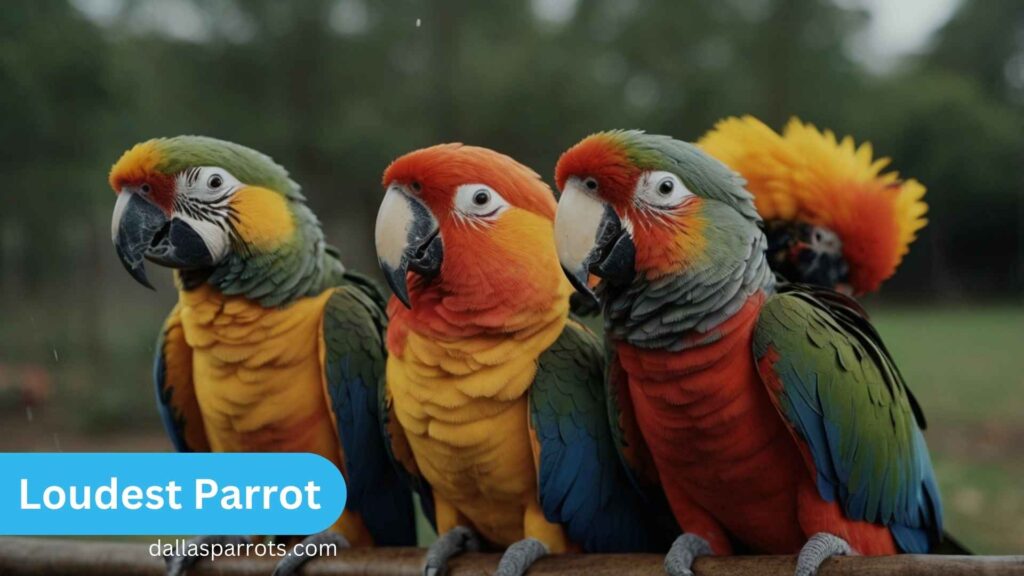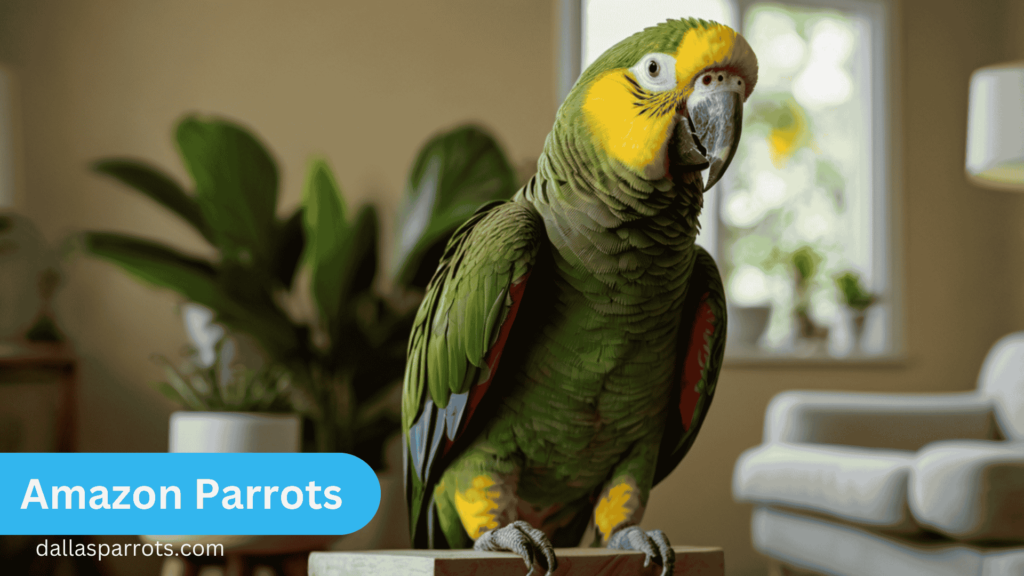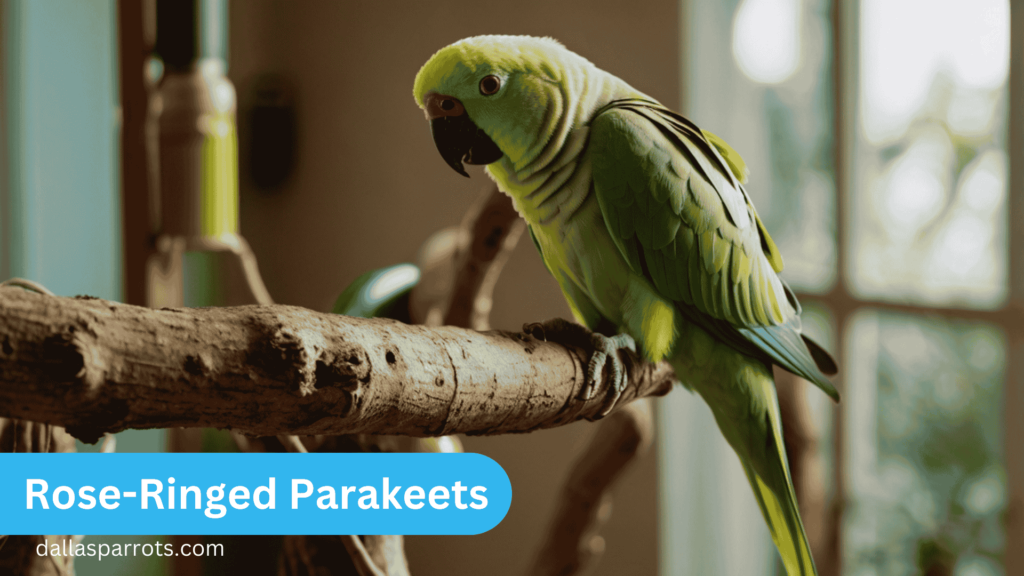

Loudest Parrot Breeds That Will Surprise You
Parrots are known for their bright feathers and fun personalities, making them a popular choice for pet owners. But did you know that parrots are also very loud? Some parrots can mimic human speech, while others make loud calls. In the wild, parrots use their voices to talk to their flock, warn of danger, and show emotions like excitement or fear.
For pet parrots, these loud sounds help them get attention or express boredom. If you’re thinking about getting a parrot, it’s important to know that some are louder than others. This guide will help you understand which parrots are the loudest, why they make noise, and how to care for them.
Cockatoos: The Loudest Talkers
Cockatoos are well-known for being some of the loudest parrot species. These birds are incredibly loving and social, forming strong bonds with their owners. However, their powerful voices can surprise even experienced bird keepers. A cockatoo’s call can reach an ear-piercing 135 decibels—about as loud as a jet engine during takeoff. This makes them one of the noisiest parrots in the world.

Why Are Cockatoos So Loud?
Cockatoos use their loud voices to communicate. In the wild, their calls travel long distances, helping them stay connected with their flock. As pets, cockatoos often scream to get attention, express excitement, or even show boredom. A lonely cockatoo, for example, may scream to let you know it wants company or playtime.
Sometimes, their loud calls are a sign of stress or frustration. If they don’t have enough mental stimulation or feel neglected, they may vocalize even more. It’s their way of saying, “I need something to do!”
How to Manage Their Noise
While you can’t stop a cockatoo from being loud—it’s in their nature—you can take steps to manage their vocalizations and create a peaceful environment.
| Tips to Manage Cockatoo Noise | Explanation |
| Spend Time with Them | Cockatoos are social birds. Spend time talking to, petting, or playing with them to keep them happy and reduce loud calls. |
| Provide Toys and Activities | Give them various toys like puzzles, chewables, and interactive games to keep their minds engaged and prevent boredom. |
| Avoid Leaving Them Alone for Too Long | Cockatoos thrive on interaction. If left alone for too long, they can get lonely and anxious, leading to louder calls. |
| Create a Routine | A consistent daily schedule helps cockatoos feel secure, which can reduce unnecessary vocalizations. |
Is a Cockatoo Right for You?
Cockatoos are ideal for people who enjoy active, interactive pets and don’t mind a noisy companion. Their affectionate and playful nature makes them incredibly rewarding pets, but their loud calls require patience and understanding. If you’re prepared to meet their social and emotional needs, a cockatoo can bring endless joy and companionship to your life.
Conures: Tiny Birds, Big Voices
Conures are small in size but not when it comes to their voices. These little parrots are known for being loud, and their calls can reach up to 120 decibels, which is almost as loud as a chainsaw. Despite their size, they can make a lot of noise!
Why Are Conures So Noisy?
Conures are very social birds that love to communicate. In the wild, they call to stay in touch with their flock, and they do the same at home. They might scream when they are happy, excited, or simply want attention. This means that a conure’s noise is usually a sign of them wanting interaction or to express how they feel.
Sometimes, they can be loud because they are bored or looking for something to do. They might shout to let you know they need more stimulation or playtime. So, when a conure gets noisy, it’s usually because they want to connect with you or because they’re feeling restless.
Best Ways to Reduce Their Noise
If you want to manage your conure’s noise, here are some tips that can help:
| Tips for Managing Conure Noise | Details |
|---|---|
| Play with Them Often | Spend quality time interacting with your conure to reduce their need to call for attention. |
| Teach Them Tricks | Engage their minds by teaching them simple tricks, helping to keep them mentally stimulated. |
| Don’t Scold Them for Being Loud | Avoid scolding your conure when they get noisy, as it may increase their stress and make things worse. Instead, distract them with toys. |
| Provide Lots of Interaction | Ensure your conure has regular social interaction to feel secure and reduce excessive noise. |
Is a Conure Right for You?
Conures make great pets for people with active lifestyles who can dedicate time to play with them and give them attention. They are friendly, smart, and energetic, but they need a lot of interaction to stay happy. If you have a busy household where the conure can get the attention it craves, they can be wonderful companions.
Macaws: Colorful and Loud
Macaws are one of the most stunning parrot species with their vibrant feathers and large size. They are not just beautiful; they are also very loud! Their calls can reach 105 decibels, which is similar to the noise of a lawnmower. Despite their size, these birds can make a big impression with their powerful voices.
When Are Macaws Loud?
In the wild, macaws are used to making loud calls to communicate with their flock, especially in the morning and evening when they wake up and rest. As pets, they tend to follow this natural pattern, making the most noise during these times. If you have a macaw, be prepared for some early-morning or evening noise.
Macaws use their loud calls to communicate, warn others, or get attention, so their loudness is often a sign of them interacting with their environment. Whether it’s calling for attention or simply waking up in the morning, these birds will certainly make their presence known.
Caring for Their Needs
Macaws are large, active birds that need space and lots of attention.
| Tips for Caring for Macaws | Details |
|---|---|
| Provide a Large Cage | Macaws are large birds that need plenty of space to move around. A spacious cage ensures they feel comfortable and can stretch their wings. |
| Talk to Them | Macaws are very social and love interaction. Spend time talking to them to build a strong bond and reduce their need for loud calls. |
| Include Them in Your Routine | Macaws thrive when involved in daily activities. Regularly bring them out of their cage to explore and be part of your routine. This helps reduce unnecessary noise and keeps them happy. |
Are Macaws the Right Pet for You?
Macaws make wonderful pets for people who enjoy having a colorful, active bird around. They require a lot of attention, space, and time spent interacting with their owners. If you enjoy a lively and engaging pet that’s full of personality, a macaw could be a great choice for you. However, be ready for their loud vocalizations, especially during early mornings and evenings, as this is part of their natural behavior.
Amazon Parrots: Talented Talkers
Amazon parrots are known for their amazing ability to mimic human speech, making them one of the most popular pet birds for those who love talking birds. However, despite their talent for talking, they can also be very loud. Their calls can reach up to 124 decibels, which is as loud as a chainsaw.

Why Do Amazon Parrots Scream?
Amazon parrots use their loud voices to communicate. In the wild, they scream to stay in touch with their flock or warn others of danger. As pets, they may scream when they feel lonely, stressed, or ignored. If they are not getting enough attention or stimulation, they might raise their volume to get noticed.
Sometimes, their loud calls can be a sign that they need more interaction or mental stimulation. Like many parrots, Amazon parrots get bored easily and will express their feelings with loud vocalizations if they are not engaged.
How to Keep Amazon Parrots Happy
If you’re thinking about getting an Amazon parrot, here are some ways to keep them happy and reduce their tendency to scream:
| Tips for Caring for Amazon Parrots | Details |
|---|---|
| Teach Them New Words or Songs | Amazon parrots are intelligent and enjoy learning new words and songs. Keeping their minds active helps prevent boredom and reduces excessive noise. |
| Spend Time Talking to Them | These parrots love attention and thrive on interaction. Spending time talking to them daily strengthens your bond and keeps them happy. |
| Give Them Attention and Interaction | Amazon parrots require a lot of social interaction. Ensure you can dedicate time daily for playtime, talking, and petting to prevent them from screaming for attention. |
Are Amazon Parrots Right for You?
Amazon parrots are a great choice for owners who enjoy teaching their pets and engaging with them regularly. They thrive in homes where they can be part of the family and receive lots of attention. However, they do need plenty of social interaction and mental stimulation to prevent excessive noise. If you love talking birds and have the time to spend with them, an Amazon parrot could be a wonderful companion.
Lories: Bright and Noisy
Lories are small, colorful parrots known for their vibrant feathers and playful personalities. While their calls aren’t as loud as some other parrot species, they can still reach up to 90 decibels, which is about as loud as a hairdryer. Lories are active birds and love to express themselves, so expect them to make noise at times.
When Do Lories Make Noise?
Lories tend to be noisy during certain activities, especially when they are excited or during feeding time. Their vocalizations may not be constant, but they can get loud when they are eager for food or when they feel playful. The noise they make is usually a way for them to express their emotions or call attention to themselves, especially when they’re excited or hungry.
Special Care for Lories
Lories have some unique care requirements that make them better suited for experienced bird owners. Here’s what you need to know:
| Tips for Caring for Lories | Details |
|---|---|
| Unique Diet | Lories have a special diet that includes nectar and fruits. Provide them with a diet that closely matches their natural food sources to keep them healthy and happy. |
| Space to Move | Lories are active and playful birds. Make sure they have enough space to move around by providing a large cage and safe, open areas to explore. |
| Playtime | Lories love to play, so provide toys and activities to keep them engaged. This helps reduce their need to vocalize out of boredom. |
Are Lories the Right Bird for You?
Lories are bright, energetic, and can be a bit noisy at times, making them a good choice for experienced bird owners. If you are new to keeping parrots, it’s important to understand their unique dietary needs and their high energy levels. Lories are best suited for homes where they get plenty of attention, space, and time to play. If you can meet their care needs, they will reward you with their playful nature and beautiful colors.
Caique Parrots: Energetic and Loud
Caiques are small, playful parrots known for their lively personalities. These birds are full of energy and love to interact with their owners. However, Caiques can also be quite loud, with their calls reaching up to 93 decibels, about as loud as a lawnmower. They are very vocal and enjoy making noise, especially when they want attention or are feeling bored.
Why Are Caiques So Loud?
Caiques will scream or make loud calls when they feel they aren’t getting enough attention or when they are simply bored. Like many parrots, they use their voices to communicate, and if their needs aren’t being met, they may raise their volume to get noticed.
Since Caiques are very active, their calls are often linked to their desire for attention, playtime, or stimulation. They also tend to make noise when they’re excited or during moments of high energy, which makes them a bit louder compared to other pet birds.
Tips for Reducing Caique Parrot Noise
If you’re considering a Caique as a pet, here are some tips to help manage their noise levels:
| Tips for Caring for Caique Parrots | Details |
|---|---|
| Give Them Plenty of Toys | Caiques love to chew and explore. Provide a variety of toys, such as puzzle toys, chewable items, and climbing structures, to keep them busy and help reduce their loud behavior caused by boredom. |
| Spend Time Playing with Them Every Day | Caiques are playful and love interaction. Dedicate time every day for activities like training sessions, games, or bonding. This will keep them mentally and physically engaged. |
| Provide Attention | As social birds, Caiques need lots of attention. Make sure to include them in your daily activities and give them the attention they crave to prevent them from becoming loud. |
Are Caiques the Right Pet for You?
Caiques are perfect for active families or individuals who have time to spend with them. They are energetic, playful, and love to interact. If you don’t mind a bit of noise and are prepared to engage with them regularly, a Caique can make a great addition to your home. Keep in mind that they require lots of toys, attention, and playtime to stay happy and healthy.
Eclectus Parrots: Quiet but Surprising
Eclectus parrots are generally calm and peaceful, making them a great choice for people who prefer a quieter bird. However, don’t be fooled by their usual calm demeanor — they are capable of making surprisingly loud honking sounds that can reach up to 115 decibels, about as loud as a chainsaw.
What Makes Eclectus Parrots Honk?
Eclectus parrots don’t typically scream like some other parrot species, but they can make a loud honking sound, especially when they are startled or want to communicate something important. These honks are often sudden and can be quite startling if you’re not prepared for them. The honking is usually an expression of surprise, alarm, or excitement.
This unique vocalization is part of their natural communication behavior, and while they are generally quiet, they will use their voice to make themselves heard in situations that require attention or when they feel the need to alert you.
How to Care for Eclectus Parrots
To keep your Eclectus parrot happy and prevent too many loud outbursts, it’s essential to meet their needs for mental and emotional stimulation. Here are some tips for managing their behavior:
| Tips for Caring for Eclectus Parrots | Details |
|---|---|
| Keep Their Environment Calm and Predictable | Eclectus parrots thrive in a calm environment with a predictable routine. This helps reduce their stress and makes them feel safe. |
| Provide Mental Stimulation | Eclectus parrots are intelligent and need mental challenges to stay engaged. Provide puzzle toys, games, or new tasks to stimulate their minds and prevent boredom. |
| Social Interaction | Although Eclectus parrots are calm, they still enjoy socializing. Spend time with them and provide attention to avoid loud outbursts. |
Are Eclectus Parrots the Right Pet for You?
Eclectus parrots are a great option for people who enjoy having a quieter bird but don’t mind an occasional loud honk. They are perfect for individuals or families who can provide a calm, stable environment, along with mental stimulation and social interaction. If you’re prepared for the occasional surprise honk, an Eclectus parrot can be a wonderful companion.
Rose-Ringed Parakeets: Chatty Birds
Rose-ringed parakeets, also known as Indian Ringnecks, are known for being very talkative. These birds love to chat and mimic sounds they hear in their surroundings. They can be quite loud, especially during the early morning hours (dawn) and at dusk.

Why Rose-Ringed Parakeets Are Chatty
These parrots are naturally vocal and enjoy communicating, whether it’s with their owners or by mimicking sounds. They love to learn new sounds and can repeat words or phrases they hear often. Their vocal ability makes them stand out among other parrot species, and many owners enjoy their ability to mimic human speech. However, their chatter can be loud at times, particularly early in the morning or as the day winds down.
Their love for social interaction means they enjoy being part of the household activity, making them excellent companions for those who enjoy talkative pets.
How to Handle Their Noise
While Rose-ringed parakeets are chatty by nature, you can manage their noise levels with a few simple strategies:
| Tips for Caring for Rose-Ringed Parakeets | Details |
|---|---|
| Create a Regular Feeding and Play Schedule | Keeping a consistent schedule helps Rose-ringed parakeets feel secure and reduces anxiety-driven vocalization. |
| Teach Them Simple Words or Phrases | Engage your parakeet in learning new words or phrases. This not only entertains them but strengthens your bond. Keep training sessions fun and rewarding! |
| Provide Plenty of Social Interaction | Rose-ringed parakeets thrive on attention. Spending quality time with them fulfills their social needs and reduces excessive noise. |
Are Rose-Ringed Parakeets the Right Pet for You?
If you love birds that are talkative and enjoy mimicking sounds, a Rose-ringed parakeet might be the perfect pet for you. They are ideal for owners who enjoy teaching their birds new words or simply love having a chatty companion. While they can be loud at times, especially during early mornings and evenings, they are charming and social birds that thrive on attention and interaction.
Conclusion
Parrots are amazing companions, but some are louder than others. Choosing the right parrot depends on your lifestyle and how much noise you can handle. Whether you prefer a chatty Amazon parrot or a playful Caique, understanding their behavior will help you build a strong bond.
Also Visit our Instagram: Click Here
FAQ’s
What is the noisiest parrot?
The noisiest parrot is the cockatoo. Their calls can be as loud as 135 decibels, which is as loud as a jet engine taking off!
What is the loudest parrot in the world?
The cockatoo is considered the loudest parrot in the world. Their screams can be heard from far away and can reach up to 135 decibels.
Are sun conures louder than macaws?
Yes, sun conures are often louder than macaws. Their calls can reach up to 120 decibels, while macaws are around 105 decibels.
What is the most spoken parrot?
The African Grey Parrot is the most famous for speaking like humans. They can mimic a wide range of words and sounds very clearly.
Which bird is noisiest?
The cockatoo is one of the noisiest birds. Their calls can be very loud, and they love to communicate with their owners.
What's the most aggressive parrot?
The Macaw can be aggressive sometimes, especially if they are not well trained or socialized. But aggression is usually a result of fear or lack of attention.
Which parrot can talk like a human?
The African Grey Parrot is the best at talking like a human. They can learn and repeat words clearly, often mimicking human speech very well.
Toggle Title
Toggle Content
Toggle Title
Toggle Content


